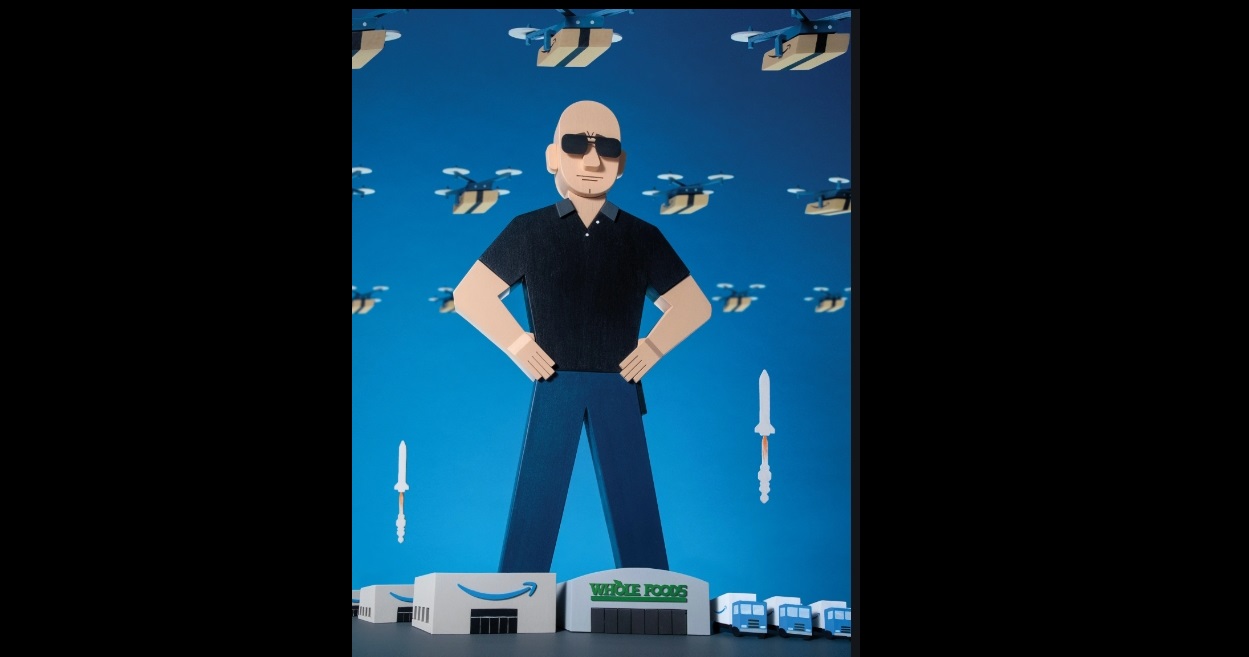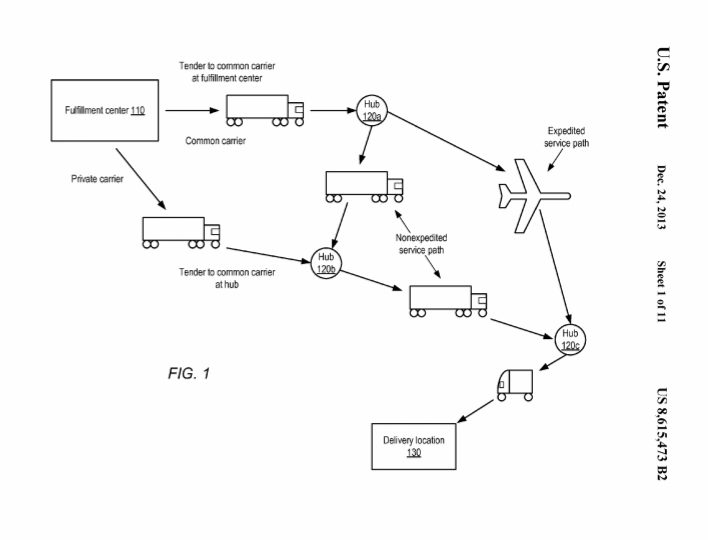
Amazon might order things for us BEFORE even we know we want it
Jul 5 . 4 min read

Have you ever searched for those black Nike shoes you saw someone wearing today and see an ad later in your Instagram and Facebook feed a few hours later? Or even without searching for them, you get apropos advertisement when you start browsing the internet?
Has all this made you believe your smartphones and smart devices such as Alexa or Google Home are spying on your conversations? Well, I’m going to leave this polemical rhetorical thread open. Albeit, Amazon’s prediction and suggestions are already very precise, it’s going to step up with Amazon’s “Anticipatory Package Shipping” patented in 2004. Amazon’s working on this for more a decade and a half on this system in which they are going to ship a package to the customer before they even order it. To be specific they’ll ship to a geographic destination and reroute it to the customers when the customer orders it and, in some cases, even without an actual order from the customer. Amazon’s collecting customers’ data for 25 years now (well exactly 26.0164years or 9,496 days’ worth of data) and the data as we know is the most valuable and expensive asset to humankind currently. When the copious amount of data is fed into machine learning algorithms the predictions can be dead on target and accurate. So, the computers at Amazon will be able to predict when and what you want to buy before you buy it. As Forbes puts it:
Amazon is wildly popular because it does three things very well: it provides the convenience of a nearly one-stop shopping experience from the comfort of your home; it remembers what you bought and when you bought it; and it recommends other products you might like, based on your shopping history
Forbes
Amazon will ship the products before you think of purchasing it, you receive the products immediately as you order them or even before you decide to order. You will receive the package and use the product then decide to pay for it. The whole Conversion Funnel is restructured. The convenience of getting the products you want before you want it is what machines can do, The convenience of gifting yourself new shoes while amazon knows the limits left in your credit card and your typical choice and budget and Finally The convenience of getting the utility without worrying, for instance worrying about the garbage bags running out or even perhaps the fresh fruits. With this blithe predictive shopping, Amazon’s doing the job for you while you can be enjoying life. Speculative shopping could enhance the shopping experience by giving gifts and promotional discounts when you want to buy the item that arrived and even as gifts when the algorithm fails, and you don’t want the product. Amazon might use the data on the supply and demand, the prices of shipping back to the warehouse to calculate the discounts, and the decision of giving the product as a freebie. As mentioned in the patient:
“The package is offered to the potentially-interested customer at a discounted price, where the discounted price depends on the determined potential cost of return or redirection. For example, rather than incur the potential cost of returning or redirecting a package without a sale, some or all of the potential cost may be offered as a discount to a potentially interested customer, such as via e-commerce portal as an inducement to convert the potential interest into an order. In some instances, the package may be delivered to a potentially interested customer as a gift rather than incurring the cost of returning or redirecting the package. For example, if a given customer is particularly valued (e.g., according to past ordering history, appealing demographic profile, etc.), delivering the package 260 to the given customer as a promotional gift may be used to build goodwill.”
Google Patent
While you may think “yeah so far so good, it is prolly gonna happen when there are flying cars and I’m grown grey-haired” then you may be wrong. Amazon started giving out “samples” in 2019 to test this out geographically. (This is a video of a drone that can be used delivery of Amazon Prime orders, no flying cars yet but we’re getting there). This speculative shopping is more common than you think it is, in an akin way to Amazon’s “anticipated shipping”, a daily phenomenon exists now and is already happening without the algorithms, we have bulk suppliers who are already ordering daily dairy and veggies every day just by speculations of everyday orders. We at our households already know approximately how much bread and flour requirements are for the month or the week. Moreover, As I am an Amazon seller, I know a significant portion of toys are ordered by customers in south India, so I regularly send it to a fulfillment center in south India for faster and cheaper delivery. A computer scientist at IBM, László Bélády, devised an algorithm to predict what will be used in the computer next and hence allocate it to the faster working memory, due to which we can browse the web and read articles such as this so quickly. This was called Bélády clairvoyance(clairvoyance is an ability to foresee can be thought of as That’s So Raven show which was aired on Disney channel, or the prophecy written by The Maharishi Markandey in his book Markandey Purana).

Supposedly, the Machine learning algorithms and AIs are already set up, what about the shipping rates and losses when the customers don’t accept the orders?
Let’s do the maths. Suppose a Rs 500 item. (sold by Amazon seller i.e Cloudtail in India).
It costs Rs 100 for Amazon. Considering it is shipping for free to the customer which costs them Rs 150. It costs Rs 250 for the item. Rs500 -Rs100(Cost of goods) -Rs150(shipping) = Rs. 250 profit which is almost 50% profit (not considering tax and packaging in this).
If they ship 1000 orders, and no one chooses to return the predicted order, Amazon earns Rs 2,50,000. (1000* 250) In an unfortunate turn of events for Mr. Bezos, all orders are returned, then paid for return orders for to and fro shipping. They lose Rs.3,00,000 (1000*150*2). That’s a bummer! Consider x as the no. of shipments to be successful (not returned) for Amazon to reach the BEP (the breakeven point) then 1000-x were shipped back.
Total Profit= Total Loss
[250*x]=[300*(1000-x)]
250x=300000-500x
x=400
So, if 400 people keep the product or 40% keep it, it reaches the breakeven point. Hence if the algorithm can beat 40% they are at profit every time. The real-life scenario can be different, but it all makes sense if correct numbers are put into a similar equation. In my opinion, they are going to be way profitable with this. The icing on the cake is, it’s going to make Amazon reach even more heights in their trove of e-commerce triumphs.
But wait a minute, what about Data Privacy? Have we signed up for this while we assiduously read all the Terms and Conditions and did due diligence while signing up for Amazon? As per Amazon’s Privacy notice
We receive and store certain types of information whenever you interact with us. For example, like many websites, we use “cookies” and we obtain certain types of information when your Web browser accesses Amazon.in or advertisements and other content served by or on behalf of Amazon.in on other Web sites. Click here to see examples of the information we receive. We may also receive/store information about your location and your mobile device, including a unique identifier for your device. We may use this information for internal analysis and provide you with location-based services, such as advertising, search results, and other personalized content.We receive and store certain types of information whenever you interact with us. For example, like many websites, we use “cookies” and we obtain certain types of information when your Web browser accesses Amazon.in or advertisements and other content served by or on behalf of Amazon.in on other Web sites. Click here to see examples of the information we receive. We may also receive/store information about your location and your mobile device, including a unique identifier for your device. We may use this information for internal analysis and to provide you with location-based services, such as advertising, search results, and other personalized content.
Amazon.in
Apparently, yes. But isn’t this psychological manipulation taking advantage of needs and oniomania of mankind? Is it similar to The Cambridge Analytica Campaign which led to Brexit and Victory of Donald Trump in the presidential election? Also, to the debunked
“enforcement” of “stringent” Facebook’s privacy policies. The internet is open to divulging data and we chose the convenience of the internet which entails the data we share.
Bibliography
1.László Bélády. (n.d.). Retrieved 7 4, 2020, from Wikipedia: The Free Encyclopedia: http://en.wikipedia.org/wiki/László_Bélády
2.Method and system for anticipatory package shipping, from https://patents.google.com/patent/US8615473B2/en
Nice work. I feel the ideas are well put